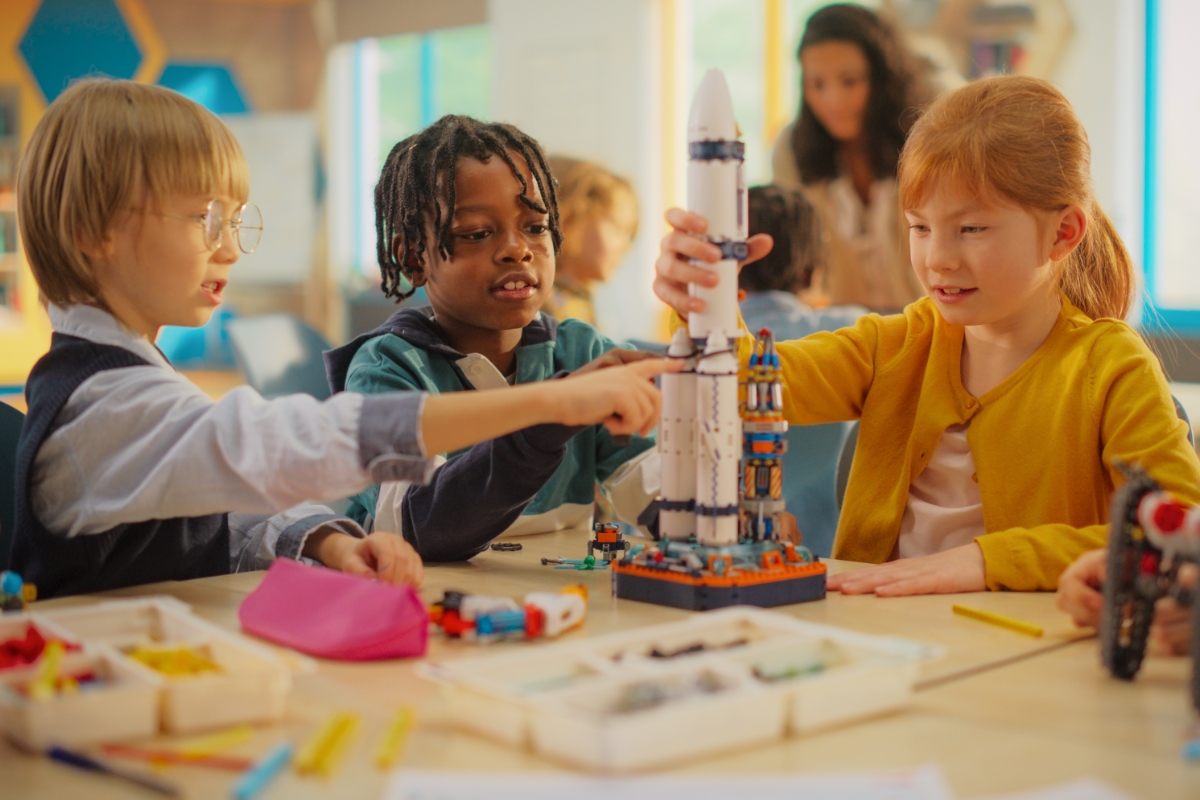Today’s young minds are tomorrow’s problem solvers. Enhancing a young mind’s passion for engineering can unlock their future potential to create sustainable solutions, develop groundbreaking technologies and improve lives.
This article will explore the importance of STEM skills and suggest ways children can develop these concepts to thrive in an ever-evolving world.
What Are STEM Skills?
STEM skills cover a range of capabilities in science, technology, engineering and mathematics. These skills include critical thinking, creativity, problem-solving and logical flair, which can be developed over time at any age through study and practice.
As technology advances within the workforce, STEM skills can give individuals a solid foundation to adapt to new challenges, innovate and problem-solve independently or in a team.
Why is There a STEM Skills Gap Predicted in The Future?
Though the demand for STEM skills is rising in many areas, such as artificial intelligence, cybersecurity, electronic systems engineering and environmental science, there are still not enough qualified people to fill these specialised jobs due to a lack of early exposure to the STEM skills required for such roles.
As a result, the future risks a shortage of professional capabilities, ultimately slowing down economic growth and progress in the industries that require such skills.
How to Address The STEM Skill Gap
Embedding STEM activities into early childhood education is key to closing the skills gap. Games, toys, and books can build interest and foundational skills that retain children’s interest, leading to targeted training and industry apprenticeships.
Employers can play a role in collaborating with schools to design internships, apprenticeships and mentorships for hands-on experience, allowing individuals to upskill and reskill to keep up with evolving technology. By making STEM education accessible and aligning it with industry needs, individuals can better prepare for and excel in specialised job roles.
Why is it Important to Introduce STEM Skills to Children?
Early exposure to STEM skills can encourage curiosity and a love for learning. It can help children gain confidence in their ability to tackle challenges and think analytically.
It can also allow everyone to be involved, breaking down stereotypical barriers and expanding diversity in engineering sectors.
STEM Games, Toys, Kits and Books to Inspire
Games
Mouse Trap
Following the board game’s step-by-step instructions to assemble gears, levers and ramps, children can gain hands-on experience, helping them to practice their overall construction skills.
Additionally, the popular game promotes spatial awareness and strategic thinking, allowing children to analyse the situation and determine the next best step to trapping their opponents’ mice.
Robot Turtles
Robot Turtles is a board game designed to teach young children the fundamentals of computer programming in a fun and interactive way. Each player, known as a ‘turtle master’, can create a set of instructions using colour-coded cards representing simple commands like forward, left or right turns.
The parents then act as the ‘computer’, also known as ‘the turtle mover’, to execute the coding instructions, moving the turtle across the board towards the coloured jewel. It’s a great way to develop computational thinking skills and introduce concepts like sequencing, debugging and problem-solving, all while engaging in imaginative play and promoting teamwork.
Minecraft: Education Edition
Minecraft: Education Edition enables children to explore concepts like coding, chemistry and physics by conducting experiments that simulate real-world science, helping to make abstract ideas more tangible. For instance, Redstone circuits, Minecraft’s version of electricity, can help children learn the basics of electrical engineering.
Moreover, the game allows children to create a virtual world from the ground up using their imagination, promotes collaboration and teamwork, and empowers children to work together on complex builds and solve worldly problems through play.
Toys & Kits
Rubix Cube
Solving the Rubix cube requires patience and strategy, which can help enhance critical thinking and perseverance. The cube also introduces mathematical permutations, enhancing children’s understanding of sequences, pattern recognition, algorithmic thinking, and problem-solving. Thus, it is a fun yet effective tool for building STEM skills.
Raspberry PI
The tiny, affordable computer allows children to experiment with coding languages like Python, create their own projects, and connect hardware components such as sensors, LEDs, and cameras. This hands-on experience introduces children to programming, electronics, and hardware tinkering. By building and troubleshooting, children can learn the fundamental concepts of computer science, electrical engineering, and data analysis.
LEGO Robotics Kits
Lego Robotic kits, like LEGO Mindstorms, can help children engage in hands-on learning using blocks, sensors and motors to introduce concepts like mechanics, coding and automation, ultimately serving as an effective gateway to the world of robotics. These robotic kits also help children understand engineering topics like engineering measurements, physics and mechanics, making them a playful yet powerful tool for encouraging problem-solving, critical thinking and creativity within the realms of robotics, machinery and automated systems.
Books
The Boy Who Harnessed the Wind by William Kamkwamba and Bryan Mealer
This true story of a young inventor promotes critical thinking, resourcefulness and a deep understanding of how sustainable engineering can solve real-world problems, in hopes of inspiring young readers to imagine how they can use STEM skills to make a difference in their communities.
Rosie Revere, Engineer by Andrea Beaty
The narrative showcases engineering concepts in a playful and accessible way, inspiring children to approach challenges with creativity and perseverance. This delightful story follows Rosie, a young girl with a passion for inventing gadgets. It highlights the importance of embracing failure and dreaming big while reinforcing that every child has the potential to be an innovator and problem-solver.
Hello Ruby by Linda Liukas
In this imaginative and interactive book, follow Ruby, a curious girl who embarks on whimsical adventures that mirror the problem-solving process of computer programming. Through puzzles, hands-on activities, and playful storytelling, children are introduced to key coding concepts like algorithms, loops, and conditionals without needing a computer. Framing challenges through fun quests helps nurture children’s logical thinking, pattern recognition, and step-by-step reasoning, all critical skills for coding and STEM skills.

Jeff Eley is the founder and managing director of Eley Metrology, a leading company in the precision measurement industry. With decades of experience in metrology, Jeff has established himself as a respected figure in the field. Under his leadership, Eley Metrology has become renowned for its expertise in coordinate measuring machines (CMMs), digital height gauges, and granite metrology products. Jeff’s vision has driven the company to develop innovative solutions, including custom-designed CMMs and the flagship long-bore measurement machine (LBM). His commitment to excellence and customer-centric approach has positioned Eley Metrology as a trusted provider of high-precision measurement tools and services for industries such as aerospace, automotive, and manufacturing.



